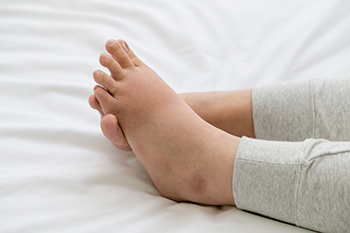
Swollen feet, an uncomfortable condition, can be attributed to various factors. One prevalent cause is poor circulation, where blood struggles to flow efficiently, resulting in fluid buildup in the feet. Prolonged sitting or standing, especially in hot weather, can trigger this. Additionally, injuries such as sprains or fractures can lead to localized swelling. Certain medical conditions, such as hypertension, kidney disease, and heart failure, can contribute to fluid retention in the feet and ankles. Hormonal changes during pregnancy also play a role in swelling. Lastly, an unhealthy diet that is high in sodium can exacerbate fluid retention. Addressing swollen feet requires identifying the root cause, maintaining an active lifestyle, and wearing comfortable shoes. If you have swollen feet, it is strongly suggested that you speak with a podiatrist who can determine the cause and offer correct relief and treatment remedies.
Swollen feet can be a sign of an underlying condition. If you have any concerns, contact one of our podiatrists of Farah Podiatry Associates. Our doctors can provide the care you need to keep you pain-free and on your feet.
Swollen feet are a common ailment among pregnant women and people who stand or sit for extended periods. Aging may increase the possibility of swollen feet and patients who are obese often notice when their feet are swelling too. There may be medical reasons why swollen feet occur:
Swollen feet can also be caused by bone and tendon conditions, including fractures, arthritis, and tendinitis. Additionally, there may be skin and toenail conditions and an infection may cause the feet to swell. Patients who take medicine to treat high blood pressure may be prone to getting swollen feet.
Many patients elevate their feet to help relieve the swelling and this is generally a temporary remedy. When a podiatrist is consulted the reason behind the swelling can be uncovered and subsequently treated.
If you have any questions please feel free to contact our office located in Trenton, MI . We offer the newest diagnostic tools and technology to treat your foot and ankle needs.
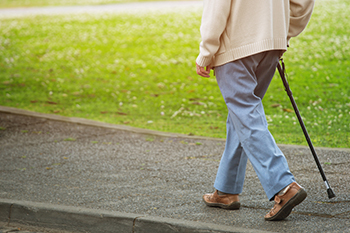
For seniors, falls can pose serious risks to both physical health and independence. Understanding the underlying causes is pivotal in designing effective prevention strategies. Factors consisting of muscle weakness, poor balance, and reduced vision can play a significant role. Medication side effects, particularly dizziness or drowsiness, can also contribute to falling. Additionally, hazardous home environments, clutter, and uneven surfaces also heighten the risk. There are methods that can be implemented to prevent falling. Engaging in a regular exercise routine can help to enhance strength and balance. Vision checks and reviewing medications with a healthcare provider can be beneficial in reducing risks. Modifying the home environment by installing handrails, improving lighting, and reducing clutter fosters safety. By addressing these causes and adopting preventive measures, seniors can confidently navigate life while minimizing the risk of falls. If you would like more information about effective fall prevention techniques, it is suggested that you confer with a podiatrist.
Preventing falls among the elderly is very important. If you are older and have fallen or fear that you are prone to falling, consult with one of our podiatrists from Farah Podiatry Associates. Our doctors will assess your condition and provide you with quality advice and care.
Every 11 seconds, an elderly American is being treated in an emergency room for a fall related injury. Falls are the leading cause of head and hip injuries for those 65 and older. Due to decreases in strength, balance, senses, and lack of awareness, elderly persons are very susceptible to falling. Thankfully, there are a number of things older persons can do to prevent falls.
How to Prevent Falls
Some effective methods that older persons can do to prevent falls include:
Falling can be a traumatic and embarrassing experience for elderly persons; this can make them less willing to leave the house, and less willing to talk to someone about their fears of falling. Doing such things, however, will increase the likelihood of tripping or losing one’s balance. Knowing the causes of falling and how to prevent them is the best way to mitigate the risk of serious injury.
If you have any questions, please feel free to contact our office located in Trenton, MI . We offer the newest diagnostic and treatment technologies for all your foot care needs.
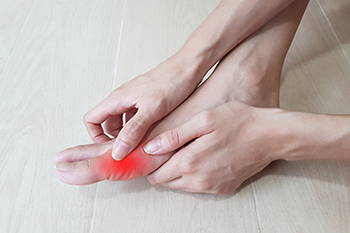
Gout is a type of arthritis that often affects the joints of the big toe, and is caused by the accumulation of uric acid crystals. There are four distinct stages of gout. The first stage, known as asymptomatic hyperuricemia, is characterized by high levels of uric acid in the blood without any noticeable symptoms. The second stage is acute gout that occurs when uric acid forms crystals which begin to deposit in the joints. This can lead to sudden and severe pain, swelling, and redness. If left untreated acute gout can progress to the third stage, known as intercritical gout, or the interval between gout attacks. During this phase, patients can experience periods of remission where symptoms subside, but it is essential to maintain proper management and lifestyle changes to prevent future flare ups. The final stage is chronic tophaceous gout, which occurs after repeated gout attacks. In this stage, large uric acid crystal deposits called tophi, can develop beneath the skin surrounding the joints and in other tissues. Tophi can lead to joint damage and deformities. Early detection and appropriate management are key to preventing the progression of gout. If you believe you have gout, it is suggested that you make an appointment with a podiatrist for treatment options.
Gout is a painful condition that can be treated. If you are seeking treatment, contact one of our podiatrists from Farah Podiatry Associates. Our doctors will treat your foot and ankle needs.
What Is Gout?
Gout is a form of arthritis that is characterized by sudden, severe attacks of pain, redness, and tenderness in the joints. The condition usually affects the joint at the base of the big toe. A gout attack can occur at any random time, such as the middle of the night while you are asleep.
Symptoms
Risk Factors
Prior to visiting your podiatrist to receive treatment for gout, there are a few things you should do beforehand. If you have gout you should write down your symptoms--including when they started and how often you experience them, important medical information you may have, and any questions you may have. Writing down these three things will help your podiatrist in assessing your specific situation so that he or she may provide the best route of treatment for you.
If you have any questions, please feel free to contact our office located in Trenton, MI . We offer the newest diagnostic and treatment technologies for all your foot care needs.
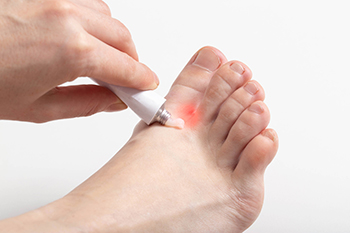
Athlete's foot, also known as tinea pedis, is a common fungal skin infection that can become serious for some people. Severe athlete's foot may be caused by different strains of the fungus or a weakened immune system, due to factors like diabetes, poor foot hygiene, or undertreatment of the infection. Symptoms of severe athlete's foot include intense itchiness, scaling, cracking between the toes, reddened or darkened skin, and a burning sensation. In severe cases, the infection can spread across the entire foot, causing dry, scaly skin, blisters, and painful ulcers. Risk factors for severe athlete's foot include sharing footwear, walking barefoot in public areas, and having sweaty feet. People with diabetes, compromised immune systems, or who live in areas where specific fungal strains are common are also at higher risk. Treatment of severe athlete's foot typically involves improved foot hygiene and antifungal medications. Preventive measures, such as keeping feet clean and dry, avoiding public spaces without shoes, and changing socks regularly, can help reduce the risk of infection. Untreated severe athlete's foot can lead to complications such as bacterial infections, cellulitis, and fungal nail infections. If you are suffering from athlete’s foot, especially if it has become severe, it is strongly suggested that you make an appointment with a podiatrist for needed treatment.
Athlete’s Foot
Athlete’s foot is often an uncomfortable condition to experience. Thankfully, podiatrists specialize in treating athlete’s foot and offer the best treatment options. If you have any questions about athlete’s foot, consult with one of our podiatrists from Farah Podiatry Associates. Our doctors will assess your condition and provide you with quality treatment.
What Is Athlete’s Foot?
Tinea pedis, more commonly known as athlete’s foot, is a non-serious and common fungal infection of the foot. Athlete’s foot is contagious and can be contracted by touching someone who has it or infected surfaces. The most common places contaminated by it are public showers, locker rooms, and swimming pools. Once contracted, it grows on feet that are left inside moist, dark, and warm shoes and socks.
Prevention
The most effective ways to prevent athlete’s foot include:
Symptoms
Athlete’s foot initially occurs as a rash between the toes. However, if left undiagnosed, it can spread to the sides and bottom of the feet, toenails, and if touched by hand, the hands themselves. Symptoms include:
Diagnosis and Treatment
Diagnosis is quick and easy. Skin samples will be taken and either viewed under a microscope or sent to a lab for testing. Sometimes, a podiatrist can diagnose it based on simply looking at it. Once confirmed, treatment options include oral and topical antifungal medications.
If you have any questions, please feel free to contact our office located in Trenton, MI . We offer the newest diagnostic and treatment technologies for all your foot care needs.
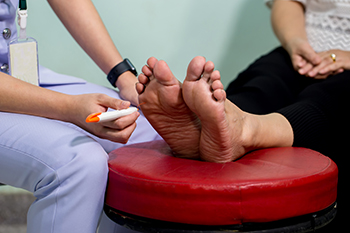
Many people with diabetes develop foot pain that directly results from their disease. One such condition is diabetic neuropathy, which is caused by nerves that have been damaged by high levels of blood sugar. The cause of severe foot pain is known as focal neuropathy, which affects one nerve at a time. On the other hand, peripheral neuropathy affects all the nerves from the spine to the feet. Factors that make diabetic foot pain more likely to occur include uncontrolled blood sugar levels, poor blood flow to the feet, plaque buildup in the arteries and veins, and genetics. In addition, the risk of diabetic foot pain increases with alcohol abuse and smoking. Having diabetic neuropathy can lead to difficulty walking, foot ulcers, and frequent foot infections. A regular foot hygiene routine is the best way to prevent these conditions from forming or worsening. For more information about foot pain related to diabetes, it is suggested that you make an appointment with a podiatrist.
Diabetic foot care is important in preventing foot ailments such as ulcers. If you are suffering from diabetes or have any other concerns about your feet, contact one of our podiatrists from Farah Podiatry Associates. Our doctors can provide the care you need to keep you pain-free and on your feet.
Diabetic Foot Care
Diabetes affects millions of people every year. The condition can damage blood vessels in many parts of the body, especially the feet. Because of this, taking care of your feet is essential if you have diabetes, and having a podiatrist help monitor your foot health is highly recommended.
The Importance of Caring for Your Feet
Patients with diabetes should have their doctor monitor their blood levels, as blood sugar levels play such a huge role in diabetic care. Monitoring these levels on a regular basis is highly advised.
It is always best to inform your healthcare professional of any concerns you may have regarding your feet, especially for diabetic patients. Early treatment and routine foot examinations are keys to maintaining proper health, especially because severe complications can arise if proper treatment is not applied.
If you have any questions please feel free to contact our office located in Trenton, MI . We offer the newest diagnostic and treatment technologies for all your foot and ankle needs.